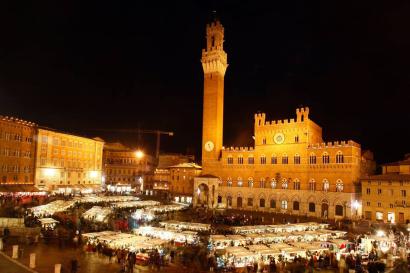I knew only one thing for certain when I decided to study abroad: I needed change. I had tried a lot of things in college, but nothing I threw at the wall seemed to stick anymore. I craved the idea of turning my life on its head: dropping everything I knew at my feet and fleeing across the Atlantic. Something about the idea struck the perfect balance between exercising ultimate control of my life and relinquishing all control. It seemed to me the purest embodiment of independence. Not escape: liberation.
Change isn’t something you notice while it's happening so much as you do in retrospect. Living in Italy presented me daily with adjustments I needed to make in my life, including the way I ate, slept, socialized, studied, traveled, dressed, and spoke. Gradually I became acquainted with the local shop owners; I began to remember who would be walking their dogs in the morning on the way to class. My inflection morphed to match the tempered friendliness of the Sienese voices around me. I stopped seeing familiar faces in public the way I so often do in New York and Boston. When I was bored, I no longer felt the need to walk around aimlessly in a store or watch television; instead I would invite the girls in my program out for drinks and listen to them simply talk about life. I grew comfortable with flying solo (literally), and learned to appreciate my own company. I became comfortable with silence, no longer filled with the restless inclination towards ceaseless productivity I felt at home. I sat with the thoughts and feelings I had let mount inside of me for years. I came to a better understanding of my self, my values, my goals. Perhaps the greatest change I underwent was developing the ability to see life as it is; the simplicity of living in Italy bestowed a clarity of mind I had never possessed in the States. My fears shrank as my resilience grew. This newfound strength assured me that I could accomplish anything I set my mind to, that I could overcome any obstacle so long as my values and beliefs were within sight.
Coming home has been strange. I told my mom I felt I had changed, and she told me that she and my father expected I would. They expected me to have found a greater sense of self-sufficiency, of independence, of worldliness, of maturity. All of these things are true, but they haven’t been the uncomfortable part.
My little corner of the world, Long Island, New York, is small and quick compared to Tuscany. People are busy. Always. Perhaps the perfect metaphor to explain the difference between these two places is how their people do laundry. In America, the washer or dryer is on constantly, cycling clothes according to the thousands of setting combinations, too many settings to possibly use. The massive machines themselves look like new cars: chrome, digital displays, LED lights, and little robot noises that accompany the turning of dials.
In Italy, my apartment had a washing machine that was as old as I am. It took twice as long to do half the amount of laundry. As for the drier: there was none. We hung our clothes on racks, even in the winter, when they might take three days to fully dry. There was no rush, no need for any one piece of clothing to be worn on any specific day. Life came as it was — and we accepted it.
In New York, coffee is grab-and-go: you don’t talk to your baristas. Nor do you smile at strangers, let alone make conversations with them. Many polite gestures that are common mannerisms in Italy could be misconstrued as flirtatious or even strange here (a probable reason we so often perceive Italians as romantic: they’re simply kinder). Strangely, after having spent three months in a program of people I’d never met, in a country of people with a different native tongue, I find myself lonelier now.
In Italy, too, the public transportation is far more thorough: train lines sprawl from cities like interwoven nerve endings. Interstate trains in the US are sparse, infrequent, and expensive. To get from New York to D.C. feels a farther journey than traveling from Siena to Rome, though the cities are about the same distance apart. In Italy, It seemed as if the entirety of Europe was at my fingertips. Even flying within the EU (say, from Italy to France) is an easier journey than flying domestically. Back on Long Island, while I may be able to drive again, I feel stranded.
At the heart of these changes I’ve felt upon returning home is the differences in choice and need. In Italy, my needs were subtracted to a basal level by the reduction in the choices I needed to make. Shopping for food was simpler: there was less need to choose because there was less to choose from. The same went for having to choose what to wear, where to eat, where to travel, and what to read. Upon returning home, I suddenly feel overwhelmed by choices: the overabundance of everything is mind-numbing. It’s no surprise that New Yorkers don’t make friendly conversation with each other in public; I feel too lost in thought of material things to fully register the people around me. Suddenly it's as if I have too many needs to be met: things I’d lived healthily without now weigh on my mind. Protein powders, perfumes, manicures, hair diffusers, imported French cheeses: the compulsion to consume is inescapable. It seems that a mentality exists here that doesn’t in Italy, a mentality which insists money must be spent to enjoy living, one which insists that life must be spent doing something to be enjoyed. What Italians call dolce far niente, or sweet idleness, does not seem to be an easy state to maintain here.
With all this being said, I hope I don’t readjust to life the way it was before. Upon coming home, I’ve been mindful of the habits I formed in my time abroad. I’m trying to be kinder to strangers for the sake of being kind, without expecting anything of them in return. I’m trying to spend less time contemplating how to better enjoy life, and instead enjoy it as it is. I’m trying to take things slower and with more humor, to live in the present rather than in the future.
Returning to New York, the part of me which has changed most is my perspective. I see things through the eyes of someone living in Italy. I see the States through the eyes of someone who is happier with less. Perhaps this perspective will fade as time rolls by, but I really hope that this small part of Italy is one I may always keep with me.

Olivia Bozuhoski
My name is Olivia Bozuhoski, and I am a Boston-based Arts Administration student. I love painting, reading, journaling, hiking, wine, and learning about art history. I am thrilled to be in Italy this semester, and even more thrilled to be sharing the experience with students like myself.








